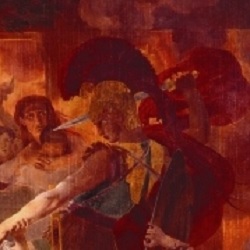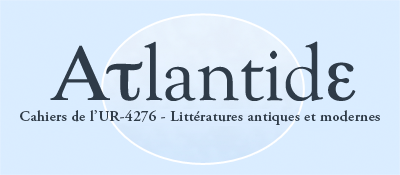 Filmic Analogies : the Trojan War in the Present. Notes toward an African Oresteia (Pier Paolo Pasolini, 1969), Troy (Wolfgang Petersen, 2004)
Filmic Analogies : the Trojan War in the Present. Notes toward an African Oresteia (Pier Paolo Pasolini, 1969), Troy (Wolfgang Petersen, 2004)
[Publication en ligne : 20 mars 2017]
Résumé : La comparaison, a priori insensée, entre le Carnet de notes pour une Orestie africaine de Pasolini (1969) et Troie de Wolfgang Petersen (2004), permet de dégager l’idéologie sous-jacente à chacune des deux poétiques mises en œuvre : deux poétiques du rapport entre l’antique et le présent, entre l’Histoire et le mythe et, ce faisant, deux conceptions du cinéma et de son rapport au monde. Chez Pasolini, l’analogie explicite entre la guerre de Troie et la guerre du Biafra, contemporaine du film, est à la fois un moment du discours analogique politique qui structure tout le film – et qui fait du Tiers monde le lieu d’une résistance espérée et vue comme encore possible à l’homologation néocapitaliste – et l’expression de la capacité du cinéma à se mettre au service du réel, à mettre au jour le mythe qui loge encore au creux de la réalité, dans les corps des humbles notamment, et à fictionner à partir de là. Dans Troie, l’analogie lâche entre la guerre de Troie et la guerre en Irak, également contemporaine du film, contribuerait plutôt à l’historicisation et à la rationalisation de l’épisode antique, autorisant alors un déplacement du mythe vers le cinéma : non plus le cinéma comme outil archéologique permettant de mettre au jour (l’invention archéologique) la dimension mythique du réel, mais le cinéma comme créateur (autre sens de l’invention), pourvoyeur de mythes, à commencer par les stars.
Mots-clés : cinéma, antiquité-contemporain, analogie, invention, star, mythe.
Abstract : The comparison, a priori senseless, between Pasolini’s Notes Toward an African Oresteia (1969) and Wolfgang Petersen’s Troy (2004) allows us to identify the ideology that underlies each of the two poetics implemented in these films : two conceptions of the relationship between the Antiquity and the present, between History and myth, and two very different understandings of what cinema is and how it relates to the world. In Pasolini’s film, the explicit analogy between the Trojan War and the Biafran War is simultaneously a moment of the political analogical discourse structuring the whole movie – seeing the Third World as a place of resistance, seen as still possible, to neocapitalistic “homologation” – and the expression of the capacity of the cinematic medium to put itself in the service of the reality, in so far as it can bring to light the myth still present in the reality, in the bodies of the humbles in particular, and to fictionalize from there. In Troy, the rather loose analogy between the Trojan War and the War in Iraq contributes to the historicization and rationalization of the ancient episode, authorizing a shift from the ancient myth to a new cinematic myth. In this process, the cinema is no longer an archaeological tool allowing to “invent” (to discover and bring to light) the mythical dimension of reality : it creates and supplies myths, beginning with the stars.
Keywords : cinema, antiquity-contemporaneity, analogy, invention, star, myth.
Pour citer cet article : Anne-Violaine Houcke, « Filmic Analogies : the Trojan War in the Present. Notes toward an African Oresteia (Pier Paolo Pasolini, 1969), Troy (Wolfgang Petersen, 2004) », Violence tragique et guerres antiques au miroir du théâtre et du cinéma (XVIIe-XXIe siècles), Tiphaine Karsenti et Lucie Thévenet (dir.), Atlantide, n° 6, 2017, p. 72-81, http://atlantide.univ-nantes.fr
Articles dans le même numéro :
Avant-propos - Christian Biet & Fiona MacintoshIntroduction - Tiphaine Karsenti & Lucie Thévenet
Ancient Tragedy Violence in the French Translations of Greek Tragedies (1692-1785)
The So-called “Vogue” for Outdoor Theatre around the Time of the First World War : Meanings and Political Ambiguities of the Reference to Greek Theatre
Aeschylus’ Persians to Denounce Modern Greek Politics
Ancient Drama and Contemporary Wars : the City Laid Waste ?
War, Revolution and Drama : Staging Greek Tragedy in Contemporary Portugal
To Tell the Trojan War Today : Contemporary Performances of Agamemnon
The Obscenity of Violence, the Obscenity of Theatre. The Dramaturgy of Carmelo Bene’s Last performance disconcertment
Kleist’s Penthesilea : a Warrior Caught up by Tragedy
Volume intégral - Violence tragique et guerres antiques au miroir du théâtre et du cinéma (XVIIe-XXIe)
&


